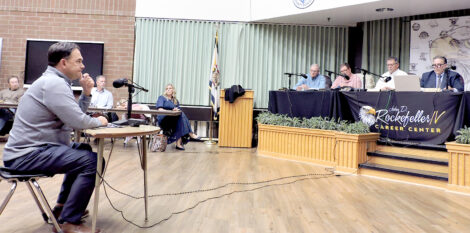Both sides spar over motion to dismiss case barring state funding for Catholic trade school
CHARLESTON — It has been more than 11 months since the West Virginia Water Development Authority awarded $5 million in infrastructure dollars to an Ohio-based Catholic trade school to expand into the Mountain State, while a lawsuit to block that funding continues.
At the end of August, the ACLU of West Virginia, working on behalf of the American Humanist Association, filed a motion in Kanawha County Circuit Court asking 8th Judicial Circuit Judge Richard Lindsay to deny a motion to deny injunctive relief filed earlier in August by the Water Development Authority.
In her Aug. 27 filing, ACLU Legal Director Aubrey Sparks argued Lindsay already denied a motion for summary judgment made by attorneys for the WDA to dismiss the case in a July 9 evidentiary hearing.
“Such a request is both procedurally improper and definitionally incompatible,” Sparks wrote. “Defendants cannot bootstrap a previously denied motion for summary judgment … merely by submitting a proposed order requesting the same relief the court already rejected.”
The ACLU-WV filed suit against the authority and its director, Marie Prezioso, in January after the authority awarded $5 million from the Economic Enhancement Grant Fund in October to the College of St. Joseph the Worker, a Steubenville-based college affiliated with the Catholic church.
The suit alleges the funding of an explicitly religious entity violates the separation of church and state enshrined in the West Virginia Constitution.
All students at the College of St. Joseph the Worker earn a bachelor of arts degree in Catholic studies while receiving training in several trades, including carpentry, HVAC, plumbing and electrical. The college promotes graduating students with zero debt.
According to the grant proposal, the college proposed using the $5 million award to create a construction and real estate company headquartered in Weirton for training apprentices, scholarships for the recruitment of West Virginia students and training facilities near Weirton, and creation of a branch campus in the Kanawha/Putnam County area.
The college also proposed using $1 million of the award for advocacy, including $750,000 to create the “Center for the Common Good” to support “life-affirming policy in West Virginia.” The proposed think tank would focus on conservative public policy. However, the grant agreement prevents the use of Economic Enhancement Grant Fund monies for anything other than workforce training.
The authority contends in its Aug. 22 filing that the grant is constitutionally sound because they have revised its terms to exclusively fund “permissible purpose(s)” such as real estate acquisition, construction and physical equipment for workforce training. They argue that the court has already affirmed the constitutionality of funding these “real estate aspect(s)” for economic development, regardless of the school’s religious affiliation.
The academic requirement of a Catholic studies degree is framed as irrelevant to the use of funds and analogous to other liberal arts “studies” programs.
“Plaintiff is wrong to say (without support) that the program will be ‘accessible only to students who will submit to the religious ideology of Catholicism,'” wrote Chief Deputy Attorney General Holly Wilson, representing the authority. “Anyone, regardless of faith background, can attend the college. Indeed, the college has enrolled several non-Catholics. The college invites students to engage with Catholic thought the same way students would be encouraged to engage with various philosophical or religious perspectives in any of the studies programs listed above.”
In her response, Sparks said the WDA motion to dismiss still doesn’t address the constitutional issues.
“This cosmetic restructuring does not resolve the core establishment clause violation identified by this court,” Sparks wrote. “While aspects of this grant description fall within the constitutional parameters described by the court, such as real estate acquisition and site development, it also contains funding to support the workforce education of students who must, in order to graduate, obtain a degree in Catholic studies — a use previously deemed impermissible by this court.”
The ACLU-WV is seeking a declaration from the court that the authority violated the state Constitution in awarding the grant and an injunction blocking the grant award.



